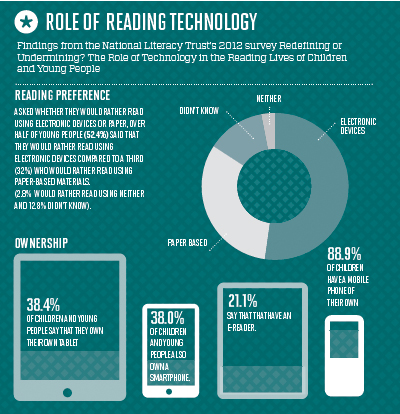For young people who are more excited by a mobile device than a paperback, ebooks could be a way to unlock a lifelong love of reading, suggests Sal Mckeown…
Children who read for pleasure are likely to do significantly better at school, according to new research from the Institute of Education. The study found that those who read for pleasure made more progress in maths, vocabulary and spelling between the ages of 10 and 16 than those who rarely read.
Schools often have children who come in at year 7 with a strong aversion to reading. Perhaps they are turned off by the mechanics – especially those who have struggled for years, rarely moving beyond decoding words, breaking them into phonemes and graphemes and then blending them.
Even those children who read well may be influenced by attitudes to reading at home. In 2005, Book Marketing Limited and Arts Council England decided to take a close look at the reading habits of the British public. They found that 45% of the population buy few or no books and that 25% of the adult population read very little or at all. Many saw it as something they would come back to in old age when they were not pursuing other pastimes. Books are seen by some as nerdy and antisocial and it is rare to see people engaged in reading a book on television or in films. If families do not read then it is little wonder that children do not see this as a worthwhile or pleasurable activity.
Technology however is viewed as intrinsically desirable. Amazon now sells more e-books than hardbacks and paperbacks combined; the company’s statistics show that the average Kindle owner buys up to four times more books he or she they did before owning the device. So it is no wonder that publishers are choosing to distribute texts as e-books in the hope of capturing a new audience. The latest Kindle advert extols the joy of reading with children obviously engrossed in stories: “When I am reading a book it’s as if I am on a different planet. I am oblivious to everything else”; “I just become part of the book” and “Sometimes I just giggle to myself.”
In Warwickshire 15 secondary schools are involved in a pilot run by the Schools Library Service targeted at KS3 pupils. The schools have access to a virtual library of 1210 e-books, which can be read on tablets or smart phones. Alice Wyatt, Schools Library Service Adviser, describes the advantages: “Often schools all want a particular genre at the same time. Take Halloween: it’s horror, vampires and ghost stories. We can provide up to five copies of a popular title but getting that around to different schools could be problematic. Now with e-books we might have one in use in a Nuneaton school one day and in Stratford upon Avon later in the week – so people are reading when they are motivated by a topic.”

The Warwickshire Library Service gets its e-library from Peters, the largest specialist supplier of children’s books to libraries in the UK. All the eBooks available for purchase are cleared for library e-lending and are DRM protected. E-books are offered for students to download and read on a wide range of devices on a one book/ one reader model. Peters has over 1000 Gutenberg titles so Wuthering Height and The Speckled Band are totally free – a powerful argument for cash strapped schools. The text is never dog-eared or shabby and if a title goes out of fashion it can simply be deleted. “Anonymity is also a big factor,” says Rachel Lindsay, Commercial Projects Developer at Peters. “Some children are embarrassed to be seen reading but with an e-reader, they could be absorbing a heavyweight philosophical tract or a high interest low level story or even accessing a game. No one needs to know.”
E-books are attractive to teachers too. The single page format is better for children with poor eye tracking skills; the ability to change text size is good for some children with visual impairments or dyslexia and the inbuilt dictionary facility is a boon for EAL students. Pupils can highlight parts of the text, bookmark key points and put in their own notes (whereas we still discourage them from writing on print books).
Depending on the device used, they can use online tools and search engines and so engage more closely with the text. They are also more likely to post their own reviews online and see what other people think. In this way, they are exposed to lots of different ideas from people who may have very different experiences and different expectations of stories.
The National Literacy Trust is more ambivalent about e-readers. Its annual literacy survey 2012 had responses from 4,910 young people aged 8 to 16 from 188 schools in England, Northern Ireland, Scotland and Wales – and found more young people read on a computer than print materials and the use of eBooks more than doubled between 2010 and 2012.
“Technology has many benefits but it is important that books are not cast aside,” comments Francine McMahon, Secondary Education Advisor. “Our research shows that the children who only read on-screen are significantly less likely to enjoy reading and less likely to be strong readers.”
An increasing number of educational publishers are creating e-books. Interactivity is at the heart of Fiction Express for Schools. It publishes e-books online in weekly episodes, which all have a cliff hanger ending. A new chapter is posted every Friday at 3.00 and pupils vote for possible plotlines on Tuesdays. The author then has three days to write the next instalment. Each story lasts five weeks and there are resources for classroom discussions, writing, drama, ICT and art extension activities.
Rachel Ost who is the English Faculty Leader at Soar Valley College in Leicester is a fan: “The children really enjoyed it and loved talking about the different things that could happen next. Our ‘reluctant readers’ said it was good to read on iPad because of the brightness of the screen and found it was less daunting than a whole book because they could only see one page at a time.”
At the Manchester Academy they have been using The Rising Stars eBooks and have found that there is more interest in reading as well as a rise in reading standards. “For me, the most convincing evidence is that there are more hands up when we ask a question, which I think is due to their increased confidence,” observes Vice Principal Jenny Langley. “There is, amongst some pupils, a perception that print books are more complicated and the topics must therefore be more challenging, whereas an e-book is familiar and an appropriate reflection of their interests outside school.”
In 2012 it was unusual for young people not to engage with technology to read. more young people read on a computer (67.1%) than read paper-based materials (such as books, magazines, newspapers; 61.8%).
About the author
Sal McKeown is a freelance special needs journalist and the author of Brilliant Ideas for Unsing ICT in the Inclusive Classroom (Routledge) and a book for parents, How to help your Dyslexic and Dyspraxic Child (Crimson Publishing).











For young people who are more excited by a mobile device than a paperback, ebooks could be a way to unlock a lifelong love of reading, suggests Sal Mckeown…